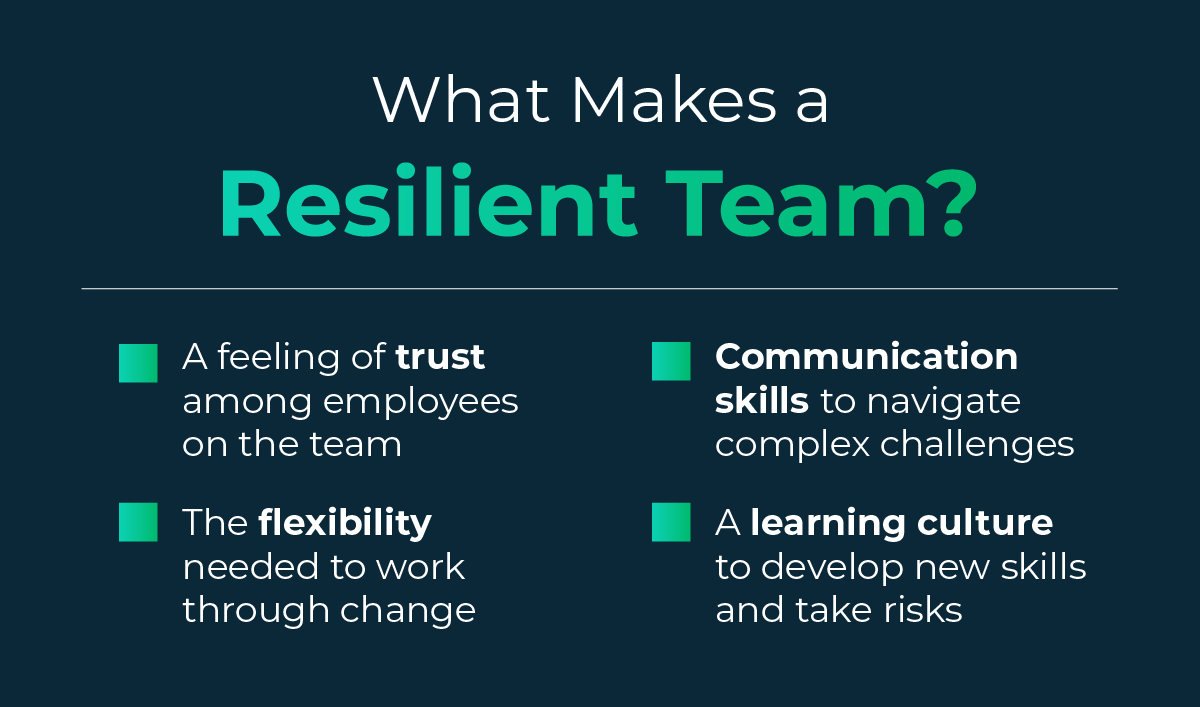How to Build Resilient Teams in a Changing Workplace

In recent years, we’ve come to recognize the importance of resilience in the workplace for individual development, education, and career progression. But resilience is also essential to high-functioning teams.
In fact, research shows that over time, team resilience is a strong predictor of increased performance. As ongoing global crises and rapid technological shifts continue to change how we do business, the ability to adapt quickly will only become more critical.
How can leaders leverage the concept of resilience as they develop more engaged and effective teams?
Deep Mahajan, Head of People Development and Culture at Nutanix, has led the cloud computing company’s employees through several major company transitions. Through these experiences, she has developed key insights on how to build resilient teams. She shared some helpful information with Emeritus in a recent conversation.
What Is a Resilient Team?
On an individual level, resilience refers to a person’s ability to adapt to changing circumstances and face adversity. The same basic concept applies at the team level: can the team rise to a challenge and learn from the experience?
Without team resilience, working relationships can deteriorate in the face of difficulties. This can lead to decreased engagement and productivity. Resilient teams, on the other hand, cannot only work through challenging times effectively but also act quickly on new opportunities to grow.
What Are the Characteristics of Resilient Teams?
Resilient teams share many key characteristics. These include the following.

1. Trust
To effectively cope with change, the individual members of a team need to feel confident they can raise concerns or challenges without a negative response. An individual’s sense of psychological safety, the belief that they can speak up or make a mistake without losing the trust of their team, reduces negative stress responses and allows for creativity and adaptability to flourish.
2. Communication Skills
When challenges arise, so does stress and the potential for conflict. Research shows that teams made up of individuals with highly-developed communication skills are better equipped to work through difficult situations.
3. Flexibility
Strong teams often rely on operating frameworks to perform effectively and efficiently. However, in times of change, working outside those frameworks and making decisions on the fly becomes essential.
4. A Learning Culture
Organizational and technological change are common sources of stress for teams. As the Wharton School of Business reports, teams with a well-developed learning culture that value opportunities to develop new skills as well as an experimentative, risk-taking approach will adapt more quickly to change. This can increase their performance potential.
Why Are Resilient Teams Important in Our Changing Workplace?
The COVID-19 pandemic, the war in Ukraine, supply chain shortages—the list of disruptions goes on. In recent years, organizations have faced a series of global events that challenge the way we do business. And with the new reality of a hybrid-first work culture and the increased use of tech like artificial intelligence and machine learning, employees are being asked to change and adapt at an unprecedented rate.
As Mahajan noted, “The level of change that people are experiencing today is multidimensional. It’s not just about the workspace; personally, how we’re running our lives is different than before. All of that asks for a different level of resilience.” Resilient teams provide a supportive framework in which employees can process these changes and thrive.
Within this context, the business impacts are significant. Resilience has been shown to have positive effects on well-being, task performance, and work engagement. Resilient teams bounce back faster from challenges, adapt to new ways of working to increase efficiency, and maintain a strong sense of cooperation in the midst of change.
What Strategies Can Leaders Implement to Promote Resilience?
Though resilience is often treated as an inherent personality trait, it can be developed over time, especially in a team setting. As Mahajan described in her conversation with Emeritus, Nutanix has used a three-step model for building resilient teams. These steps include:
1. Develop Self-Awareness Through Shared Assessments
When Mahajan works with teams at Nutanix, she has all team members complete behavior and personality assessments like DiSC profiles. Managers and team members then discuss the findings. The goal is to increase their awareness of one another’s preferences and work styles to refine how they communicate and interact.
2. Evaluate Team Efficacy
After teams have had time to digest their learnings from the self-assessment phase, they consider their shared performance using benchmarks based on Patrick Lencioni’s “Five Behaviors” model. This exercise allows them to celebrate areas of shared strength and identify places where additional work may be needed to build resilience and increase performance.
3. Provide Customized Support to Address Growth Areas
After those two initial steps have been taken, Mahajan provides tailored solutions to address teams’ specific needs. For example, Nutanix might provide teams with learning opportunities around communications and time management or address a specific skills gap that causes holdups.
What Skills Do Managers Need to Develop Resilient Teams?
Often, developing individual skills can help teams build resilience. Paying attention to emotional intelligence, flexibility, and innovative thinking all benefit teams. However, Mahajan points out that managers often need additional development and support to grow and lead resilient teams. These are the major areas she identified.
1. The Ability to Empathize
Even in a hybrid environment, Mahajan says, “the need to connect is still there.” While many perceive empathy as an innate trait, Mahajan has found that it can be taught and developed. It’s especially important, she says, to encourage managers to spend time developing personal relationships with team members and equipping them with tools to handle difficult situations and conversations.
2. Reducing Bias
“Having a diverse and inclusive environment is so important for day-to-day wellness,” Mahajan says. Though most companies have increased their focus on issues of bias in the workplace, she notes that the new dynamics of hybrid and remote work run the risk of introducing additional forms of discrimination, like denying development opportunities to employees who choose to work from home.
“It’s essential for managers to guard against this bias when building careers and working with their employees,” Mahajan says.
3. Maintain a Sense of Humor
Though it may not always make the list of essential management skills, Mahajan recommends that leaders maintain a sense of humor throughout changes and challenges.
“We’re helping (employees) develop the skills to lighten tough conversations,” Mahajan says. She adds that prioritizing moments of levity and fun in the workplace can help employees navigate difficult times with resilience and joy.
In today’s world, disruptions are inevitable. Developing teams with the skills and resilience to manage during periods of uncertainty and change can help companies navigate difficult times more nimbly while maintaining productivity and engagement.
Looking for development programs that can help you build a more resilient team? Emeritus Enterprise offers customized online employee training programs to meet your needs.





